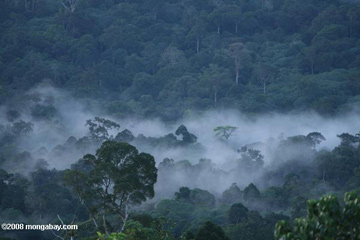Papua signs REDD carbon deal to generate income from rainforest protection
Papua signs REDD carbon deal to generate income from rainforest protection
Rhett Butler, mongabay.com
May 14, 2008
The government of the Indonesian province of Papua has entered into an agreement with an Australian financial firm to establish a forestry-based carbon finance project on the island of New Guinea.
The project — which could involve more than one million hectares — aims to create “a perpetual financial base for local communities” through carbon credits generated by forest conservation.
“There is a high level of interest in establishing pilot projects for forest conservation based on carbon finance,” David Brand, Managing Director of New Forests, a Sydney investment firm, said. “The project aims to deliver high-quality carbon credits to the voluntary market based on the government’s decision to rescind the logging and agribusiness development status of the land.”

|
Last December Papuan Provincial Governor Barnabas Suebu imposed a province-wide moratorium on logging in hopes that the emerging carbon market would offer better returns for the people of Papua. Logging and forest conversion for agriculture — especially oil palm and rubber plantations — are an important source of revenue for the province.
“Conversion of these spectacular forests to agribusiness would be a great loss,” Governor Suebu said. “I hope this approach can provide a new development path for the forests and people of the Province of Papua.”
The new agreement is based on Reduced Emissions from Deforestation and Degradation (REDD), a proposed policy mechanism that would compensate tropical countries for safeguarding their forests. Because deforestation accounts for around a fifth of global greenhouse gas emissions, efforts to reduce deforestation can help fight climate change.
While REDD was explicitly excluded from the Kyoto Protocol, policymakers meeting at climate talks in Bali last December signaled that forestry would play a role in future emissions mitigation schemes.
The Papua deal comes six months after New Forests announced an innovative plan to generate investment returns by protecting wildlife. The scheme will establish a wildlife habitat conservation bank to manage and rehabilitate the 34,000-hectare Malua Forest Reserve on the island of Borneo.
Related articles
 |
Investing to save rainforests
(4/2/2008) Last week London-based Canopy Capital, a private equity firm, announced a historic deal to preserve the rainforest of Iwokrama, a 371,000-hectare reserve in the South American country of Guyana. In exchange for funding a “significant” part of Iwokrama’s $1.2 million research and conservation program on an ongoing basis, Canopy Capital secured the right to develop value for environmental services provided by the reserve. Essentially the financial firm has bet that the services generated by a living rainforest — including rainfall generation, climate regulation, biodiversity maintenance and carbon storage — will eventually be valuable in international markets. Hylton Murray-Philipson, director of Canopy Capital, says the agreement — which returns 80 percent of the proceeds to the people of Guyana — could set the stage for an era where forest conservation is driven by the pursuit of profit rather than overt altruistic concerns.
Merrill Lynch invests $9M in rainforest conservation, expects profit
(3/12/2008) Merrill Lynch’s investment in a rainforest conservation project in the Indonesian province of Aceh is worth $9 million over four years, reports Thomas Wright of The Wall Street Journal.
Aceh, Papua, Amazonas governors sign carbon-for-forests pact
(12/8/2007) Three governors have signed the Forests Now Declaration to protect tropical forests for their carbon value. The Governors, Irwandi Yusuf (Aceh, Indonesia), Barnabas Suebu (Papua, Indonesia), and Eduardo Braga (Amazonas, Brazil), agreed to the declaration’s action plan which calls for compensation for reduced greenhouse gas emissions from deforestation and protection of standing forests. Deforestation and forest degradation account for roughly 20 percent of human-caused greenhouse gas emissions, but steps to reduce forest loss will help mitigate climate change. The UK government’s 2005 Stern Review said that forest protection could be one of the most cost-effective ways to address climate change.
Rainforest logging moratorium established in Indonesian provinces, Amazonas state
(12/7/2007) Governors from the Brazilian state of Amazonas and the Indonesian provinces of Aceh, Papua and West Papua signed a historic agreement to protect threatened rainforests.
More carbon finance news














